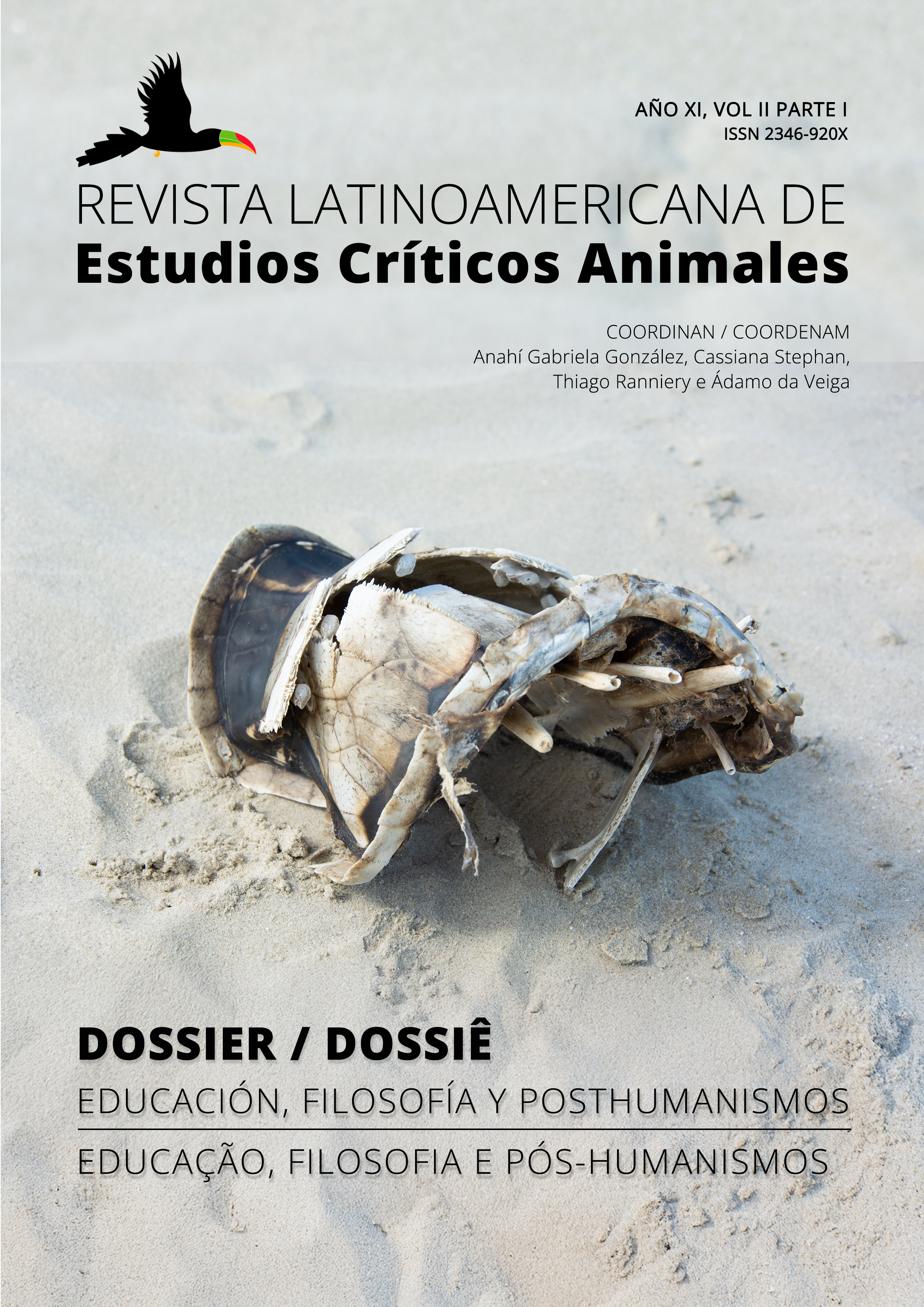Contributions to the defense of an anti-speciesist language: the case of the term ‘gado’ in Brazilian politics
Keywords:
cattle, ecofeminism, human language, oppressionAbstract
This article aims to analyse the case of the use of the term gado [cattle] in Brazilian politics on a social network, to contribute to the discussion about how speciesist language restates animal domination and subordination from an ethical-political perspective. This paper is structured in four sections: a) a survey of quantitative data on the use of the term gado on Twitter between January 2016 and August 2021; b) an analysis, from the animalist ecofeminist paradigm, of the meanings of the term and data regarding its increasing use in the Brazilian political context; c) the (in)visibilization of non-human subjects as individuals through language, specially, oxen or cows, by using the word gado; d) reflexions on an anti-oppressive language, which demands understanding ourselves from a continuum of interdependent relationships, besides not using the word gado when referring to people considered uncritical.
References
Aalzola, E. (2010). “The anthropocentric paradigm and the possibility of animal ethics”. Ethics & the Environment, 15(1), pp. 27-50.
Adams, C. J. (2010). The sexual politics of meat. A feminist-vegetarian critical theory. Londres: Continuum.
Ades, C. (2010). “Do bicho que vive de ar, em diante: uma pequena história da Etologia no Brasil”. Boletim Academia Paulista de Psicologia, 78(1), pp. 90-104.
Buchanan, B.; Bussolini, J.; Chrulew, M. (2014). “Introduction: philosophical ethology”. Angelaki: Journal of the Theoretical Humanities, 19(3), pp. 1-3.
Butler, J. (2021). Discurso de ódio: uma política do performativo. São Paulo: Editora Unesp.
Capilé, K. et al. (2021). “Exploring the Representation of Cows on Dairy Product Packaging in Brazil and the United Kingdom”. Sustainability, 13(15), 8418.
Despret, V. (2021). O que diriam os animais? São Paulo: Ubu.
Donovan, J. (1996). “Attention to Suffering: Sympathy as a Basis for Ethical Treatment of Animals”. En: Donovan, J.; Adams, C. (eds.). Beyond Animal Rights: A Feminist Caring Ethic for the Treatment of Animals. Nueva York: Continuum, pp. 147-169.
Dunayer, J. (2001). Animal Equality: language and liberation. Maryland: Ryce Publishing.
Dunayer, J. (1995). “Sexist Words, Speciesist Roots”. En: Dunayer, J. Animals and women. Duke University Press, pp. 11-31.
Ereshefsky, M. (2022). Species. The Stanford Encyclopedia of Philosophy. Recuperado de: https://plato.stanford.edu/entries/species/. Último acceso el 13 abril de 2022.
Joy, M. (2010). Why we love dogs, eat pigs, and wear cows: An introduction to carnism. San Francisco: Conari Press.
Khell, M. (2008). Nature Ethics: An Ecofeminist Perspective. Lanham: Rowman & Littlefield.
Krenak, A. (2019). Ideias para adiar o fim do mundo. 2. ed. São Paulo: Companhia das Letras.
Linné, T.; Pedersen, H. (2017). “With care for cows and a love for milk: Affect and performance in dairy industry marketing strategies”. En: Potts, A. (ed.). Meat Culture. Leiden: Brill Academic Publishers, pp. 109-128.
Meijer, E. (2019). “Introduction”. En: Meijer, E. When Animals Speak: Toward an Interespecies Democracy. Nueva York: New York Universsity Press, pp. 1-12.
Marino, L.; Allen, K. (2017). “The psychology of cows”. Animal Behavior and Cognition, 4(4), pp. 474-498.
Plumwood, V. (1993). Feminism and the Mastery of Nature. Routledge: Londres.
Oliveira, F. A. G. (2021). “Especismo Estrutural: os animais não humanos como um grupo oprimido”. Em: Parente, Á.; Danner, F.; Silva, M. A. (org.). Animalidades: fundamentos, aplicações e desafios contemporâneos. Puerto Alegre: Editora Fi, pp. 48-71.
Rosendo, D. (2019). Quilt ecofeminista sensível ao cuidado: uma perspectiva de justiça social, ambiental e interespécies. 237 f. [Tesis de Doctorado en Filosofía, Universidade Federal de Santa Catarina, Florianópolis].
Rosendo, D.; Kuhnen, T. (2021). “Ecofeminismos”. In Blogs de Ciência da Universidade Estadual de Campinas: Mulheres na Filosofia, 7(2), pp. 6-40. Recuperado de: https://www.blogs.unicamp.br/mulheresnafilosofia/ecofeminismos/.
Taylor, S. (2017). Beasts of Burden: animal and disability liberation. Nueva York: New Press.
Warren, K. J. (2000). Ecofeminist Philosophy: A Western Perspective on What it is and Why it Matters. Oxford: Rowman & Littlefield.
Waśniewska, M. et al. (2018). “A dog or a wolf: The role of connotations in animalistic metaphors and the process of dehumanization”. New Horizons in English Studies, 3(1), pp. 3-17.
Downloads
Published
Issue
Section
License
Copyright (c) 2024 Revista Latinoamericana de Estudios Críticos Animales

This work is licensed under a Creative Commons Attribution-NonCommercial-ShareAlike 4.0 International License.
La Revista Latinoamericana de Estudios Críticos Animales con ISSN 2346-920X se adhiere a las diferentes iniciativas que promueven el acceso libre al conocimiento, por lo que todos los contenidos de la misma son de acceso libre y gratuito y publicados bajo la licencia Creative Commons, que permite su difusión pero impide la alteración de la obra e incluye siempre mención al autor/a y fuente.
Es decir, una licencia de tipo Atribución-NoComercial-SinObraDerivada.
Por ello, los correos electrónicos de los autores se encontrarán a disposición de los lectores, en caso de que deseen contactarlos personalmente.




